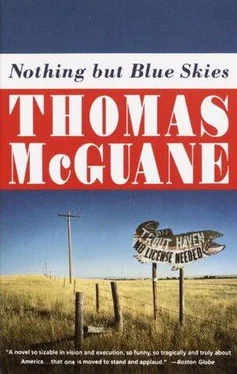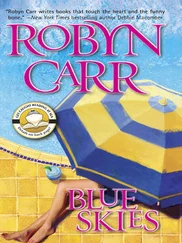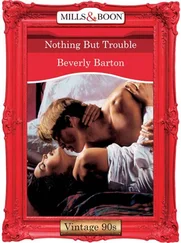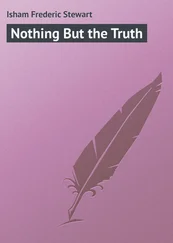“I have underestimated what a delicate thing life really is,” Frank began. “I was rolling along there like a house afire for well over a decade. I knew this thing happened with Gracie. It wasn’t what I wanted. But I certainly thought I would survive it and I guess I will. But I’m certainly not the same guy and it sort of pisses me off.”
“I love it when you’re lonely,” said June.
“That’s really not it.”
“I thought this was some bug going around.”
“It is. But you know Gracie better than anybody. You’re both from the South. Is Oklahoma in the South?”
“Sorta. And yeah, that’s half our trouble. You don’t have the love of people that we have. When you go to falling out here, there’s no bottom to it. They’ll just watch you fall.”
“Huh. Do you think Gracie agrees with that?” This hurt his feelings. He wanted everyone to love the West.
“She had you. She had Holly. She had friends. She was making a beginning. But these are the meanest white people in America. Your kids up and grown, your marriage fails, nothing holds you.”
“What holds you? ”
“The ’ninety-two Buicks. They’re beautiful. Make your mouth water. Each one is a little world.” She smiled. “The ’ninety-threes will be even better.”
God, it was wonderful to hear someone looking forward to something that was actually going to happen. Next year’s cars. He told June that.
“Well, it isn’t going to last,” she said. “You’re gonna have to take aholt, son.”
“I know this.”
“And Gracie’s in town. So, maybe you ought to spend the time to polish off those jagged edges. You’ve both got to go on. You don’t want to leave off like you did. And this is the first time in your life since I’ve known you when you didn’t seem to care about making money. You better take advantage of it.”
“Okay. But Gracie’s okay. That guy’s probably got a lot of money. I know money isn’t everything …”
“He’s a sharp one, that Ed. He knows how to make it. Do you know what his big trick was?”
“I hadn’t really heard. I suppose Gracie told you.”
“She did and she wasn’t happy. He used to be a dealer of Indian artifacts but he got crossways with the law. I guess he married one of his wealthy customers but she was in a bad car wreck. Now he buys life insurance policies from people who have been diagnosed with AIDS. He cashes them out at a discount. He says that gives them money for medicine, which he knows won’t work, and it allows them to buy a little dignity, which it may. That’s quite an idea, isn’t it, Frank?”
“Quite an idea,” Frank said numbly.
“He still sort of has this wife, but she throwed him out on account of the wreck. He was sad about that because she was sure enough well fixed. So, have I helped you?”
“Thank you, Junie-friend. You’ve helped me.”
“For what it’s worth, I never heard Gracie say she was in love with him.”
Frank got up and went downstairs with June. He washed the dishes and she dried. Then they went out into the front yard and raised the American flag. He smiled up at it in his bathrobe as the cool mountain wind made it crack over the busy street. He arranged to have Darryl’s truck repaired, and June said she’d find Darryl and set it up. Aspirin was helping his discomfort and he was building confidence. The sunlight angled against the sides of houses along the street. A man with a huge pockmarked nose led a pair of straining Irish setters, one from each hand, up the hill. He had his billed cap on backward as though anticipating a sled ride. Frank commented on June’s beautiful yellow Buick in his driveway, its eventful curves shadowed by the dark arms of the old maple.
There seemed to be a slight visual vibration over everything. He thought of what June had said about the West. He knew Gracie used to feel that way too. The tone of the West had been set by the failure of the homesteads, not by the heroic cattle drives. The tone was in its bitter politics. But that wasn’t the whole story. He knew it was a good place. He knew Gracie had been coming to see that. There was something in its altitude and dryness and distances that he couldn’t have lived without; and it was a good time to remember that. When he was walking in the hills and could see sundown begin about forty miles away, or smell running water in the bottom of a sagebrush ravine, or watch the harriers cup themselves to the curve of earth and slash through clouds of meadowlarks, he felt that thankfulness. It was always a starting point. He went to the mirror and watched himself say, “I love it here.”
Monday morning in the American West. J. P. Morgan was pissing off the securities firms by expanding its underwriting. Now I’m happy again, thought Frank. Dog eat dog. Stock prices higher, bonds surge, NASDAQ sets record for third day. Nervous investors looking for strong earnings records. John Deere is laying people off. Restructuring charges were producing a quarterly loss for United Technologies. Not a word about chickens.
On the hope that there is synergy even in failure, Frank had invited Orville Conway of Wilsall, Montana, to his office for a meeting. He had read over the weekend, between morose fits of bathrobe living, that Montana’s ninth-biggest chicken farmer was facing bankruptcy. Frank thought this could be the missing portion of the synergy he dreamed of for his old hotel. Orville Conway’s defeat implied that the seven-month winter canceled certain business opportunities. It was especially poignant in the case of Orville Conway, who was widely admired as a modern and skillful practitioner in the industrial multiplication of chickens. The very word “failure” made Frank reach out to Orville, and so he called him and told him he had an idea.
Orville got right past Eileen and presented himself in Frank’s doorway. He had a rawboned, rural face with deep-set eyes and prominent enough teeth that it was quite a struggle for him to keep them covered with his lips. He also had a fashionably blow-dried hairdo that formed a kind of pouf just over his forehead, covered half his ears and came down over the collar of his buck-stitched blue western sport coat. The possibility of failure hung over Orville Conway like a soggy, impermeable cloud of desperation and defiance. Frank stood briskly and came out from behind his desk, thrusting his hand into Orville’s big, work-hardened mitt. The weight and toughness of that hand in the context of the sartorial fancy and mushroom cloud of impending doom touched Frank. He could see that, imperiled as his own business life was, he had more edge left than Orville Conway. Still, they shared the prospects of financial desolation, and that was inspiring.
“Please sit down, Orville.”
“Thank you.”
“Can I have Eileen bring you some coffee.”
“I’m all coffeed out,” said Orville. Frank picked up the phone and asked Eileen to hold his calls.
“Orville, I learned about some of your business problems in the paper,” Frank said, and Orville reddened right out to his ears. Frank had not seen such shame in a grown man before.
“We’re talking about restructuring some debt,” Orville murmured.
“That just slows things down, gives the bank a deeper choke hold on you.” Frank was instantly dizzied by his wrath against banks.
There was a sustained quiet as Orville Conway took his time evaluating the moment. “I don’t have a lot of choices. It’s all I’ve ever done. This was my shot and I took it. I don’t have a lot of information about other businesses. I got a wife and kids at home. And we done pretty good all along there, considering. It’s not an excuse to talk about changing times. I’m way too far from the transportation. The bank’s got a pretty good lien on the place. I done this all on the home place and it’s about two thousand feet higher than here and it is just too darn cold. I already starved out there once, in the cow business. Feed costs are high, but really, it’s bein’ high and cold and too far from things. I hate like heck to go under and I’m not going to let it happen if I don’t have to. I feel kind of bad about, you know, whoever might have been looking for me to go ahead and make it come out right.”
Читать дальше












